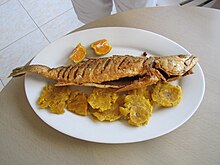|
Tostones
Tostones (Spanish pronunciation: [tosˈtones], from the Spanish verb tostar which means "to toast") are twice-fried plantain slices commonly found in Latin American cuisine and Caribbean cuisine. Most commonly known as tostones in Jamaica, Puerto Rico, Mexico, Nicaragua, Cuba, Honduras and Venezuela, fritos in Dominican Republic, they are also known as tachinos or chatinos (Cuba), bannann peze (Haiti), patacones (in Ecuador, Panama, Venezuela, Colombia, Costa Rica and Peru) and, sometimes, patacón pisao in Colombia.[1][2] PreparationGreen (unripe) plantains are peeled, sliced lengthwise, diagonally, or widthwise, and then fried twice.[3] The raw slices of plantains are fried for one to two minutes on each side until they are golden in color, and removed and patted to remove excess cooking oil. Afterward, they are pounded flat with a hinged utensil made for the task, called a tostonera, or less conveniently, with any kitchen utensil with a sufficiently large flat surface—for instance, between two plates. The flattened plantain slices are then fried once again until they are crisp and golden brown. In Puerto Rico making tostones is typically a three-step process rather than two used in other countries. Plantains’ tips are cut off and boiled with the skin on until almost cooked through. The skin is removed and the plantains are cut into chunks and fried, flattened and then refried. Most Puerto Ricans use the method of soaking the plantains in hot water with salt for a few minutes before frying. Both of these methods result in a softer, moist center with a crispy exterior. Serving Tostones are salted and eaten much like potato chips/crisps or French fries/chips. In some regions, it is customary to dip them in mojo (a garlic sauce) or ají. In Colombia they are sometimes served with hogao sauce[1] or topped with seasoned shredded beef.[2] In Costa Rica, they are often eaten with a paste-like dip made from black beans. In the Dominican Republic, they are commonly served with fresh lime wedges to squeeze over them and salt for sprinkling. In Guatemala on the Caribbean side, they are usually served as a side dish with fish or any poultry, sprinkled with a little salt. In some countries, they are served topped with cheese as an appetizer or with shrimp ceviche, pulled chicken, or avocado salad.[4] They can also be bought prepared from supermarkets. This dish is found in all varieties of Caribbean cuisine. In Nicaragua, they are typically served with fried cheese and sometimes with refried beans. In Puerto Rico, they are commonly seasoned with garlic salt and eaten with fry sauce, mojo, or pique verde boricua. Tostones are also a staple of Latin American countries and the Caribbean, including Cuba, Puerto Rico, Dominican Republic, Panama, the north coast of Honduras, and in Haiti, where they are often served with the traditional griot (fried pork) or pikliz, a spicy slaw. They can also be found in West African cuisine, where they are referred to as plantain crisps. VariationsTostones made from unripe breadfruit called tostones de pana are served in Puerto Rico. The same method applies. Unripe breadfruit is cut into chunks, deep-fried, flattened, and then fried again. They are popular throughout the island and are sold frozen pre-made by Goya Foods, Mi Cosecha PR, and Titán products of Puerto Rico. Tostones rellenos is a traditional Puerto Rican dish of fried plantains or breadfruit shaped into cups and stuffed with various fillings. ToolsA tostonera is a tool used to make tostones, which are flattened, fried plantains. Tostoneras can be made from wood, plastic, or metal and can vary in size. Tostoneras are an essential tool in Latin kitchens and are used to make tostones. Other uses of the termIn Honduras, the term tostón may also refer to the 50-cent coin of the local currency, the lempira. This is also the case in Mexico with 50 cents of a peso. See alsoReferences
|
||||||||||||||||||||||||||


